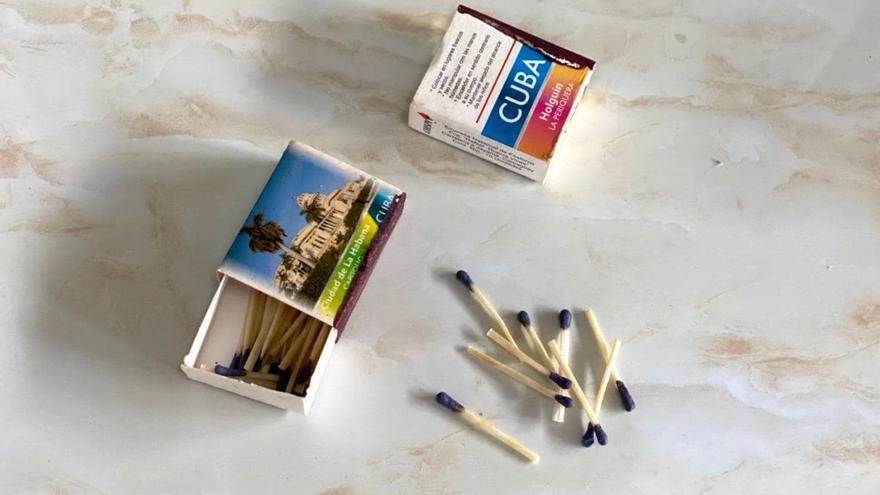
![]() 14ymedio, Lorey Saman, Mexico, 7 November 2020 — Some products and services have earned a place of honor in the jokes and ridicule of Cubans. Bread, internet connections and matches compete for the most maligned position, the latter for their poor quality, the danger they represent when they do not meet certain standards and because they are cursed every day in kitchens throughout the Island.
14ymedio, Lorey Saman, Mexico, 7 November 2020 — Some products and services have earned a place of honor in the jokes and ridicule of Cubans. Bread, internet connections and matches compete for the most maligned position, the latter for their poor quality, the danger they represent when they do not meet certain standards and because they are cursed every day in kitchens throughout the Island.
Even Cuban comedians, who have a lot of material, make fun of matches, but now not only because of their terrible quality but also because they are an endless target of “search and capture” — impossible to find. Even your hidden sources and contacts don’t have them and those who have them do not sell them, and more than one stove has remained cold for several days because of the absence of them.
In addition to food shortages, an ever-present theme in Cuban daily life, matches have disappeared from the state markets in recent months. In Sancti Spíritus, since the Ministry of Internal Trade announced in August the modification of the product sales system from regulated to regulated release, “most of the people of Sancti Spiritus have not managed get them,” the local press published.
Nor are they the matches dreamed of by cooks, smokers and the lighters of spiritual candles. With a fragile body and a wayward head, they can end up burning clothes rather than lighting a stove. The poor quality of the boxes and the damp sandpaper are part of the nonsense that makes it take three to five attempts to light one.
The Cuban government never allowed the private production and distribution of matches, according to ministerial sources, for fear that allowing private hands to possess certain raw materials could also lead to the creation of firecrackers and explosives. For more than half a century they have been a state monopoly, like tobacco, coffee and telecommunications.
Three months after the decision by which, according to the aforementioned ministry, each territory must establish “the network in which the product will be marketed, serving all the popular council areas,” the people of Sancti Spíritus can’t even find a match with “a magnifying glass,” Escambray points out.
The reality of Sancti Spíritus is that, since August, only one shipment has been received from the two producing industries that supply the province and “previously they used the existing reserves to deliver the last regulated allocation that was pending,” the official newspaper reported. According to an official interviewed, there are difficulties with receiving the imported raw materials needed to ensure the manufacture of matches.
“For years the matches were sold unrationed in the bodegas — the ration stores — but with this collection of chaotic circumstances they have disappeared from shops because the people who sell through online ads have bought up the whole supply to resell them,” a housewife residing in the city of Santiago de Cuba told 14ymedio.
Unlike Sancti Spíritus, which is supplied by shipments from the National Phosphorus Company from Havana, Santiago de Cuba has one of the four factories in the country, so they can be found more easily. “They give me four boxes a month, but on the street they are 5 pesos,” said a resident of the Vista Alegre neighborhood from Santiago.
Another consumer dissatisfaction is the poor quality of the production. A reader asked the Granma newspaper in 2018, why is it so difficult to light the matches that the country markets, referring to the fact that they have “an extremely poor quality, out of a hundred ten work, if that,” in addition to the fact that the sandpaper is not effective and the boxes are half empty.
According to the official media, the Ministry of Industries recognized that the dissatisfactions with the quality of the product were due to the deterioration and aging of the equipment of the National Match Company and “the solution lay in the execution of technological investments that would allow achieving the efficiency parameters and productivity.”
In addition to continuing poor quality, the sale of matches has always been closely controlled. Cubans attribute this control to their possible use in protest actions. The truth is that, even in the boom years of the Soviet subsidy, the sale and distribution of matches was closely supervised and the quantities that an individual could acquire were always scarce.
____________
COLLABORATE WITH OUR WORK: The 14ymedio team is committed to practicing serious journalism that reflects Cuba’s reality in all its depth. Thank you for joining us on this long journey. We invite you to continue supporting us by becoming a member of 14ymedio now. Together we can continue transforming journalism in Cuba.
